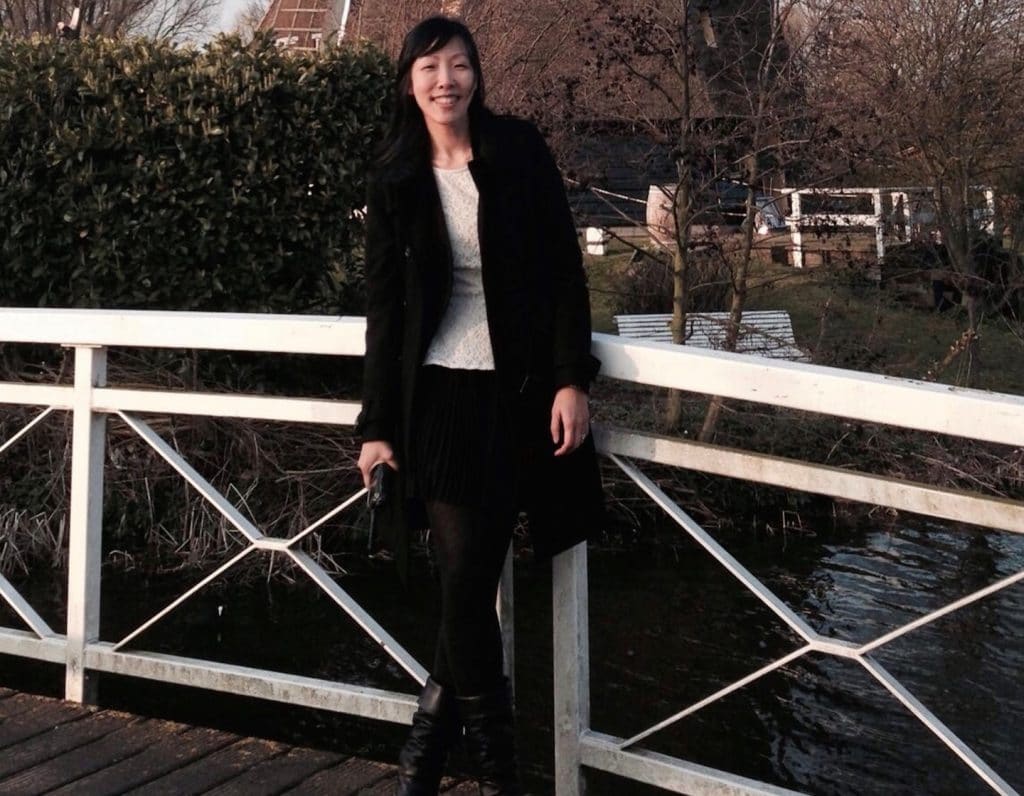
Overseas Singaporean mamas are doing amazing things all over the world! Vivien Won talks about raising a trilingual son and sells us on the benefits of German education in the city of Koblenz
In 2015, Vivien Won gave up a career with the Ministry of Foreign Affairs, and her husband’s job eventually brought them to his hometown of Koblenz, Germany. She just may be the only Singaporean in Koblenz, a pictureseque, mid-sized city situated halfway between Cologne and Frankfurt along the Rhine River, which has allowed her to connect with her German neighbours. In this week’s interview, she helps to shed some light on the intricacies of the German education system and society, as well as the role local football clubs play in child character development.
Click here to read about more Overseas Singaporean Mamas!
Can you tell us a little about yourself?
My husband, Daniel, is German and our son, Julien, is eight years old this year. I haven’t worked professionally since we moved to Malaysia and subsequently to Germany. I used to work in the Foreign Service and now I split my time between taking care of our household and Julien, teaching him Chinese and English as well as teaching English to a few German kids here in Koblenz.
I speak English with my husband, pretty broken German with everyone else, English or Mandarin with my son, and Cantonese with the boss at the Vietnamese supermarket in Koblenz. I also speak French but it is not very useful these days. It has been very interesting getting to know people in Koblenz. I’m not completely new here as I’ve been seeing my in-laws and Daniel’s relatives regularly over the last 12 years. Nonetheless, it has been challenging adjusting to a place that is monolingual, with no one speaking much English.
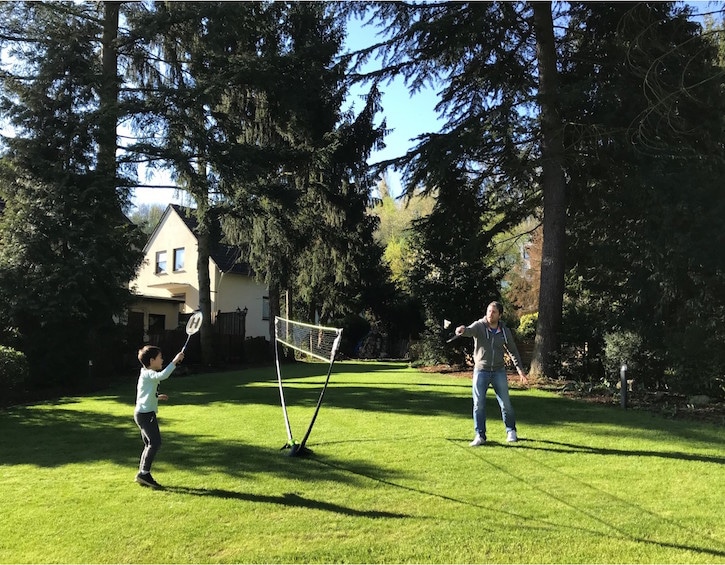
What brought you to Koblenz, Germany? How long have you been living overseas?
We have been living overseas since 2013, owing to our respective jobs. We moved to Brussels, Belgium because of my work when Julien was two years old, while Daniel worked and lived in Hamburg, Germany. After two years as a single working mum, we reunited when I decided to quit my job. My husband was posted to Kuala Lumpur, Malaysia and we spent three years there.
In 2018, we moved to Koblenz when his company posted him back to Germany, not far from Koblenz. Koblenz is where my husband grew up in and his family and relatives still live here so we jumped at the chance to finally live close to family again. It’s been almost two years now and we have begun to feel really at home here.
Favourite aspect about living in Koblenz?
People are friendly and there is lots of nature around. We live by the Rhine, which is a really beautiful river. Being close to my husband’s family is the best part about living in Koblenz and having the support that we didn’t have the last six years we lived outside of Singapore.
We also love being able to go on holiday here without taking an airplane, as air travel is something I have come to dread. We have driven a few hours to the ski slopes in Austria and France, and even driven all the way to Paris and Normandy recently. Koblenz itself is surrounded by forests, rivers, lakes, vineyards and medieval towns so we often go trekking and biking.
And the worst part?
For me, it is the lack of good Asian and Southeast Asian food. I have learnt to recreate many of the dishes we love from home including sushi, tonkotsu ramen and bak chor mee. I even grow my own Thai basil so that I can make pho and stir-fry Thai basil and pork.
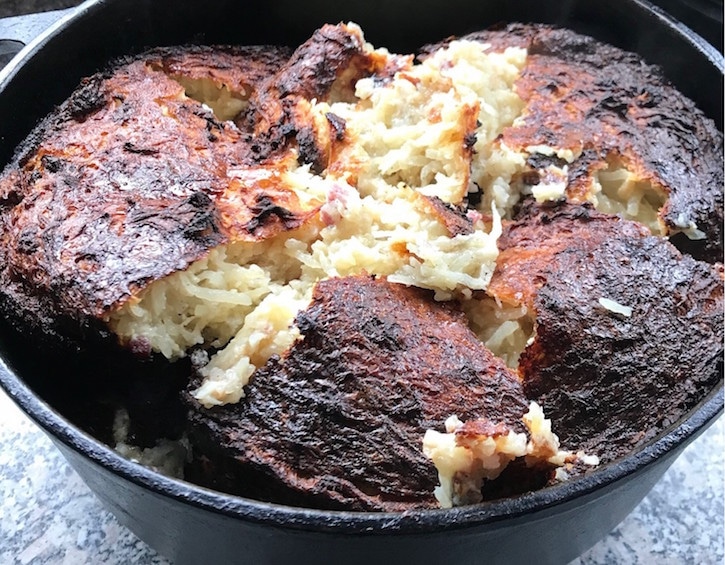
The typical German diet is very meat-heavy (and also processed), which is something I’m not used to, having grown up on a diet with lots of fish and vegetables. There is, however, a dish unique to Koblenz called debbekochen, which I really like. It is a huge casserole of grated potatoes with crispy bacon, baked for over three hours, and served with homemade apple compote. My mother-in-law makes a killer debbekochen (pictured above)! I miss good Asian food and spices but German beer and wine more than make up for that.
Speaking of food, I’ve become an accidental ambassador for Singaporean cuisine here in Koblenz. Singaporean food has become an intercultural bridge between my German neighbours and I, most of whom have never been to Singapore or tasted our food.
I recently spent a whole morning at a neighbour’s house, showing her how to make wanton and gyoza, and in the process, learning a lot about regional German cuisine as well! So while language might be the wall between cultures, food is the universal translator that unites us.
Your most recent purchase…
… for your child?
The long-awaited latest book from the Treehouse Series, The 117-Storey Treehouse.
…for yourself?
Plants for my garden. Gardening takes up a big part of my time, something I never got a chance to do when I lived in cities.
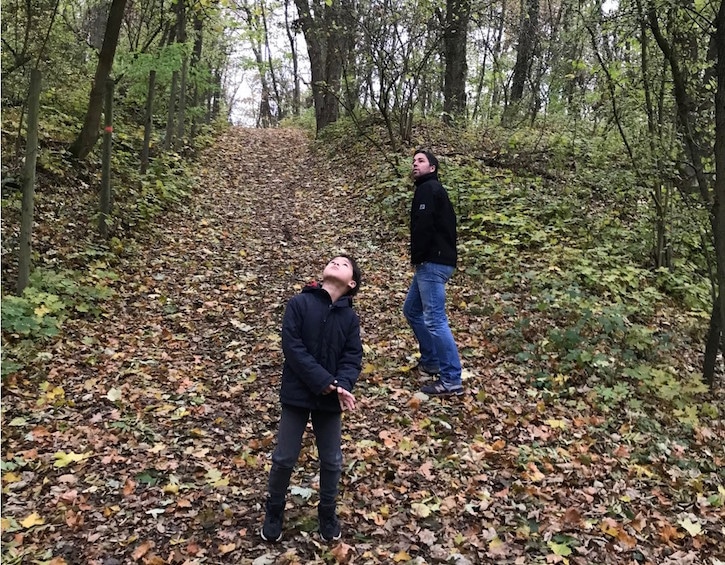
How do you think parenting in Koblenz differs from parenting in Singapore? What do you appreciate most about it?
The most obvious difference is the lack of competition and stress in school. I appreciate the fact that in Germany, everyone takes education seriously but they are not in intense competition to get into a particular school, an academic track or even university. Children do not learn to read and write until they start primary school, which means they just play during the first six years of their lives. It also means that everyone is on an almost equal footing when they start formal education. There are no tests or exams in the first two years of primary school and there is no Primary School Leaving Examination (PSLE)-like national exam at the end of primary school!
There is no stigma to not having a university degree here because those who choose a technical track would do an apprenticeship at the end of their studies and can land a job that affords them a decent standard of living. People who have what we deem “blue-collar” skills are very highly sought after.
Of course inequality does exist but people are not judged on social status so the education system is not as punishing as that in Singapore. You are more than the school you attend, the job you do and the house you live in. As a parent, I have less anxiety about whether my child will become successful because success is defined very differently here.
The other clear difference in parenting is how children are expected – and encouraged – to be independent from a young age. My son has been walking to and from school since he started primary school here. He organises his own play dates after school and children are often seen playing outside or at one another’s homes, unsupervised.
In terms of adult-led activities after school, children usually take up sports like football, as my son does, and tuition classes are unheard of in primary school. What they say about German football is very true: it is highly-disciplined and just about every town and village has its own football club.
At the age of four or five years old, kids train at least twice a week and compete in tournaments during the football season. It’s thanks to the highly-organised football culture that Julien was able to integrate immediately into school and make numerous friends, many of whom are in the same football club.
I appreciate this a lot because children here socialise from a young age and learn to cooperate, negotiate, manage conflict and, above all, accept defeat (which was very, very hard for a 7-year-old who had lost his first match!) or be gracious winners. I think these skills are even more vital than having good academic results.
Germans pay great attention to character formation. For example, 30 percent of my son’s school report was focused on social aptitude and behaviour as well as his attitude towards learning and schoolwork. Perhaps it is also part of German culture to emphasise “right” moral, ethical and social behaviours. You have to be prepared for people in the street telling you that you’ve not done something “properly” – the antithesis of the “mind your own business” mentality I am more used to.

Did you give birth to your child in Koblenz? If yes, what was memorable about the experience?
I gave birth to my son in Singapore, as we were living there then. I chose to have a Caesarean delivery after being in labour for 12 hours without much progress. It was a great decision because when he was finally born, we found out he weighed 4.28 kg.
Can you talk us through your career pre- and post-baby?
Pre-baby, I worked part-time as a lecturer in sociology while I was doing my master’s degree. I joined the Foreign Service afterwards when I decided that a career in academia was not for me. It was a wonderful decision, taking me into the real world of politics, policy and people, completely different from what I was previously doing (research). My learning and development curves were steep and I devoted myself to my work.
Life and career post-baby took an interesting turn for me because as a full-time working mother, I started to appreciate bosses who are reasonable and kind and colleagues who are supportive as I find myself juggling two roles which demand equal amounts of energy, time and emotional commitment.
Career decisions have a much bigger and more complicated impact on your life when there are children in the picture. I decided to give up my job in mid-2015 because my husband and I found ourselves in a situation where we could not both have our careers and a child at the same time.
One of the biggest lessons I’ve learnt as a parent is that the twists and turns of life shape every decision we make, both big and small, and people do not always get to make rational decisions so we shouldn’t stereotype anyone thinking we know their situation, be they single parents, full-time working mothers or stay at home parents. I have met many women – and men – like me who have made difficult decisions to give up their financial independence and careers or put them on hold.
Favourite kid-friendly restaurant in Koblenz?
There are many biergartens (beer gardens) in Koblenz where one can enjoy a nice meal with kids and dogs in open air. My favourite restaurant here is El Castillo as they have really tasty tapas but it is normally quite crowded. My son’s favourite is, of course, the ice-cream parlour eGeLoSIa in the Altstadt (old town), where the snaking queue can take as long as 45 minutes in the summer.
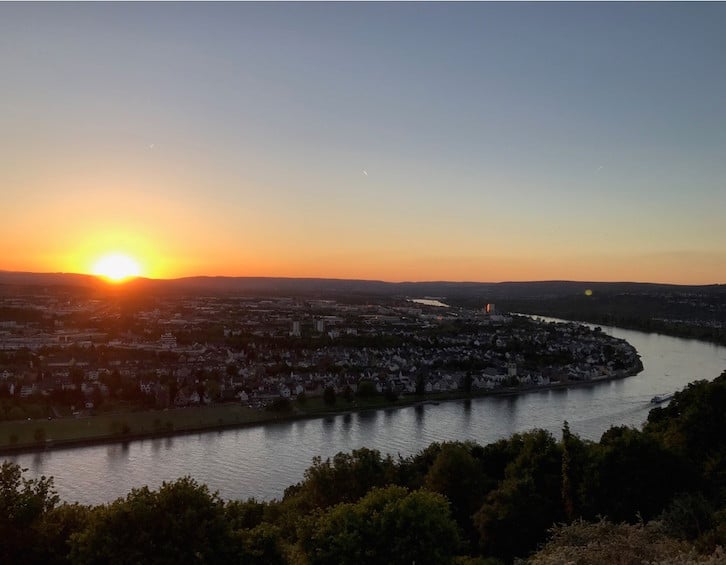
Top five places in or around Koblenz you would recommend to parents travelling with kids?
- Festung Ehrenbreitstein – Stroll from the city’s famous Deutsches Eck (German Corner) along the Rhine to the Seilbahn Koblenz cable car station, which takes you up over the river to the ancient Ehrenbreitstein Fortress where you can get a stunning view of the city, the Moselle and the Rhine. There is a huge park and playground next to the fortress and you can also watch the sunset over the Eifel, a volcanic mountain range in the northwest. In the summer, there are often free outdoor music concerts at the fortress and numerous exhibitions for children at the museum inside. If you can, don’t miss Rhein in Flammen (Rhine in Flames), the annual fireworks celebration every summer that attracts throngs of tourists.
- Burg Eltz – There are many river cruises from Koblenz in the direction of Cologne, where one can spot many castles. If you really like castles, there are a few in the area but our favourite has to be Burg Eltz, a 45-minute drive from the city. It is a hidden gem nestled in a valley that will take you on a 20-minute hike through the forest to reach.
- Remstecken – Remstecken is a wildlife park about 15 minutes by car from the city. Small children will love it as they can feed wild deer, boars, antelopes and go on a pony ride. The best part is entry to the park is free. There is also a very nice playground for children. For kids older than six years old who like the outdoors, Kletterwald Sayn in the nearby town of Bendorf is an adventure park in the forest with treetop climbing and zip lines.
- Strolls and bike rides – Koblenz is relatively small and very walkable. You can walk through the Altstadt to see old buildings and churches, explore the many gardens or walk along the Moselle until you reach the water playground near Deutsches Eck. We often ride our bikes along the Rhine to nearby towns like Lahnstein and the picturesque Bad Ems, known for its hot springs. You can also ride your bike along the Moselle through the hillside vineyard or go waterskiing and windsurfing.
- Laacher See – The Laacher See is a volcanic lake and the largest lake in the federal state of Rheinland-Palatinate. Families can take a boat ride on the lake and water sports are available from April to September each year. Families with school-age children might enjoy the Lava-Dome, a volcano museum about 20 minutes away by car in Mendig, which comes with a tour of the underground tunnels formed by ancient lava flow to the site where rock mining used to take place in the post-war years.
Any advice for surviving a flight with young children?
Always keep them occupied! When Julien was under four years old, we would always bring along his favourite toys, books and colouring materials on a flight. This is how we survived annual trips to Germany that took 12 hours each way. In fact, this was also how we got through all the times we ate in restaurants. Even today at eight years old, my son still has his pencils and paper for flights and restaurants, although it is much easier these days with in-flight entertainment.
Is there something that you do to keep your child in touch with his Singaporean roots?
I spoke to him exclusively in Mandarin from birth till the age of six, when I finally used English with him! It wasn’t so much for his roots but more that he would be able to communicate with my father and other relatives. I saw many of my peers growing up, unable to communicate with their grandparents, including my own sister, and I didn’t want the same for my son. This is also why his father only speaks German with him – so that he could speak with his German grandparents. Of course we visit Singapore fairly regularly and I’ve learnt to cook our favourite Singaporean and Malaysian dishes so his palate is still very Asian!

Best souvenir one could bring back from Koblenz…
For a child?
HABA and Hape wooden toys that are so popular but expensive in Singapore would make really nice gifts and they cost only half the price here.
For a mama friend?
Koblenzer Küsschen, artisanal chocolates from Koblenz that are best savoured slowly in your mouth, hence the name “Koblenzer Kisses”.
What do you find is the hardest part of being a mother living in a foreign country?
Not being fluent in the language makes it really tough to follow parent-teacher meetings and to establish friendships in a new place. German is my fifth language and learning it at a ripe old age of 39 means it is the hardest one to master. Communication in daily life has been relatively easy for me, having been here for more than a year, but being unable to reach an advanced level of proficiency means that I am unable to fully integrate or be fully understood and accepted. It has given me a deeper appreciation of what it means to be a “foreigner”.
On raising multilingual children …
I have always believed that multilingualism is achievable, given the right conditions. My parents’ generation, one that could speak Malay, English, Mandarin and other dialects, proved this quite clearly way before the Singapore government introduced the bilingualism policy in the 60s and 70s.
From my own experience growing up multilingual (my grandparents spoke Cantonese and Hainanese, my mother spoke English and my father in Mandarin), my husband and I set out to ensure that our son would have the resources and conditions he needs to become fluent in English, Mandarin and German.
We did this using the One Person, One Language (OPOL) approach, which is why I spoke only Mandarin with my son for his first six years even though it was very difficult for me since Mandarin is not my mother tongue. He was in British international schools from three to almost seven years old. Now he is in a local German public school and is much more fluent in German than in Mandarin.
In Germany, people are always surprised to hear Julien speak German like a native without an accent. Ironically, we often get mistaken as being from China or Taiwan whenever we speak in Mandarin in Singapore!
When we moved to Germany, I made the decision to speak with Julien in English as well (with Mandarin taking up less than 50 percent of his day) in order to keep up his native standard of English. Being trilingual in a largely monolingual society is a difficult line to tread. I am now my son’s Chinese tutor and this is by far the biggest daily challenge for me!
Living outside of Singapore has helped me see the importance and value of being able to communicate in multiple languages, something I would have taken for granted in our bilingual education system.
What do you always bring back from Singapore for yourself and for your child?
I usually bring back a full suitcase of local ingredients and condiments, among them sambal belacan, Prima Taste’s prawn mee sauce kit, and century eggs – things I can’t find in my Asian store here.
Tell us about your go-to recipe for your family:
Wanton Mee. My condiment shelf has all that I need to whip up noodles quickly and I always have frozen wanton wrappers on hand, although I will sacrifice the char siew if I’m in a hurry.
What’s the one thing you would miss about Koblenz if you moved away?
The people – our family and friends. Also having electrical sockets in the bathroom, something you can never find in Singapore, Malaysia and the United Kingdom!
Read about more overseas Singaporean mamas here:
Debra de Silva-Sun in Basel, Switzerland
Sara Yun Tzy Koh-Press in Istanbul, Turkey
Demelza Thoegersen in Mombasa, Kenya
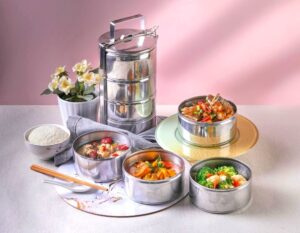





 View All
View All




 View All
View All









 View All
View All




